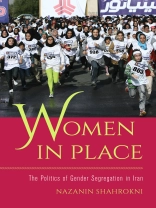While much has been written about the impact of the 1979 Islamic revolution on life in Iran, discussions about the everyday life of Iranian women have been glaringly missing.
Women in Place offers a gripping inquiry into gender segregation policies and women’s rights in contemporary Iran. Author Nazanin Shahrokni takes us onto gender-segregated buses, inside a women-only park, and outside the closed doors of stadiums where women are banned from attending men’s soccer matches. The Islamic character of the state, she demonstrates, has had to coexist, fuse, and compete with technocratic imperatives, pragmatic considerations regarding the viability of the state, international influences, and global trends. Through a retelling of the past four decades of state policy regulating gender boundaries,
Women in Place challenges notions of the Iranian state as overly unitary, ideological, and isolated from social forces and pushes us to contemplate the changing place of women in a social order shaped by capitalism, state-sanctioned Islamism, and debates about women’s rights. Shahrokni throws into sharp relief the ways in which the state strives to constantly regulate and contain women’s bodies and movements within the boundaries of the “proper” but simultaneously invests in and claims credit for their expanded access to public spaces.
Über den Autor
Nazanin Shahrokni is Assistant Professor of Gender and Globalization at the London School of Economics. Prior to establishing an academic career, she worked as a journalist for Zanan, a feminist monthly in Tehran, Iran.









